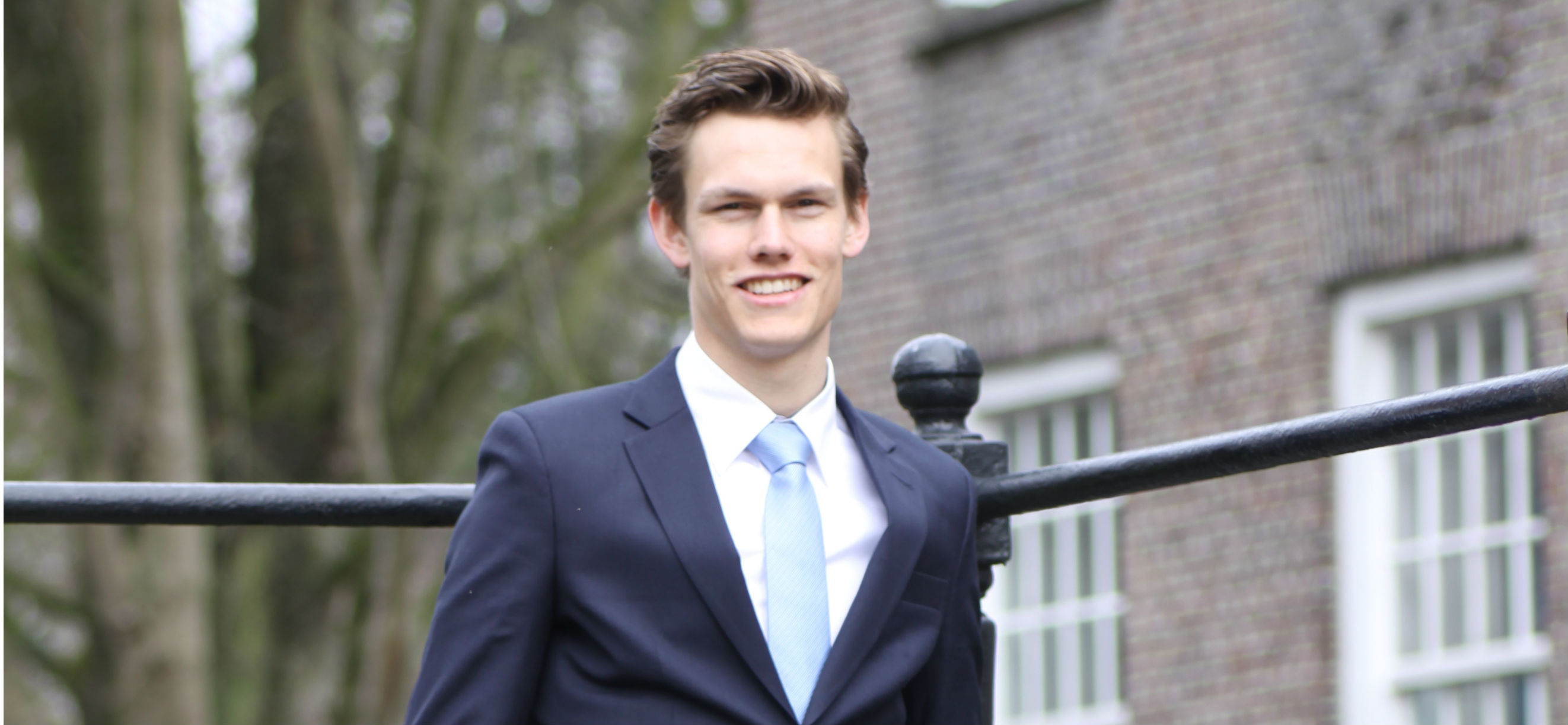Looking back at my chairmanship at Asset | Accounting & Finance
The editorial board has asked me to write an article about last year, in which I was chairman of Asset | Accounting & Finance. Let me start with emphasizing that this article is not meant as a sales pitch for doing a board year, nor is my goal to attract new board members. As a student, you will have heard enough already. Besides, it has never been a problem to attract new board members for Asset | Accounting & Finance (unlike many other student associations). I think because many people know that a board year at A&F is a valuable asset. Such a year is taken seriously, and is more than just ‘a year of fun’. You may have noticed I find it hard to talk about it without sounding like I am doing some sort of sales pitch. This is probably because my board year was amazing.
“A board year is just a wasted year in which you spend most of the time in bars”
In 2013, I became vice-chairmen of the Investment Night committee. Together with four other committee members I had eight months to organize a symposium on investing in the stock market. Even though I really liked the work, I did not attend that many activities organized by the association. I barely knew the board members and I had no idea what they were doing in their offices all day. The only time I saw them was at the few drinks I attended. This led me to believe a board year was just a wasted year in which you would spend most of the time in bars. During the evaluation conversations that are held with all active members individually, the board asked me if I would be interested in a doing a board year (all members are asked this question). I convincingly replied ‘no’. However, about one year later, after the strike of the gavel, I was appointed Chairman by the General Members Meeting of Asset | Accounting & Finance and was giving a presentation about the policies for the upcoming year on which we had worked in the three preceding months.
“I actually had no clue what was awaiting me”
When I look back now, I can say I actually had no clue that I had just set foot in a 22nd century rollercoaster, waiting to be launched. Two weeks after the general members meeting for example I was unexpectedly having lunch with the President and Rector Magnificus of Tilburg University, together with another board member. We spoke about the new policies of the university and the role which our student association should fulfill. In addition, they shared some lessons from their board experience and we were told that is was inappropriate that we were not wearing ties (which we had torn off just before they entered the building because we could see from the window that they were not wearing ties either). Two weeks later, I gave a presentation to all Master Accounting and Finance students, explaining them the opportunities we could offer them and why it is so important to seize them.
Shortly after that, I organized and chaired a meeting where I welcomed the general directors of the Accountancy department of Tilburg University and the Big Four Accounting firms (EY, KPMG, PwC and Deloitte) at one of the most beautiful conference halls of the university. We discussed the future of the accountant’s profession and the university’s role in it. We also discussed the quality of students that got their degree at Tilburg University, and we compared it to students of other universities. The meeting went perfect, and as the icing on the cake, the Big Four stressed that there is a big difference in the quality of students who had been active at Asset | Accounting & Finance, and students that hadn’t.
“We are comparable to a company with 110 employees”
Next to these highlights there was also the daily course of business. When I have to explain to people what I actually did on an average day, I like to compare the student association with a company. A company that acts as an intermediary between students and the business arena. A&F has about 110 ‘employees’ (committee members) and a (sometimes double) fulltime board consisting of six people. Like in most companies, the board decides on the policy and sees to it that it is properly executed. To get a broad idea of what this policy covers: it is a booklet containing about 50 pages and includes everything the association does: an overview of the activities portfolio, working out strategies for acquisitions (new partners), budgeting, social media, long-term vision, active member’s policy, and so on. Besides that, the board coordinates the committees which consist of four to seven people (it is like leading a team or taskforce). Every committee has one specific task, such as organizing a study trip to Rio de Janeiro, delivering content for our blog, or organizing a symposium about accountancy. And where a company relies on its employees, we rely on our amazing committee members. That is why we try to make it as fun and valuable as possible for our active members by organizing (in)formal activities, trainings and drinks.
“The decisions you make can amount to tens of thousands of Euros “
It took a while for me to really realize how big the budgets were. Sometimes the decisions you make can amount to tens of thousands of Euros. This was for example the case when we had to decide whether to launch a new website that would contain a native CRM system that would simultaneously administer all 6000 members, or when we had to negotiate with Studystore about a new contract for our students to buy books at a discount. Overall, big decisions, with big consequences. That made me realize why recruiters value a board year so much. It may sound cliché, but I have developed myself much more during my board year than in all my prior years at university.
“It all happens during a cup of coffee“
The biggest lesson I learnt is the importance of communication. It was crucial to keep in touch with the members, other boards, our partners and the university. I can relate very well now to the saying “It all happens during a cup of coffee”. Low threshold communication, like having an informal chat with an active member at the coffee corner, can yield more than having a formal evaluation meeting about the association. Another interesting aspect of communication that I learnt, is that the way in which a message is brought, can be more important than the message itself. There is an academic research that perfectly supports this statement; It was an experiment in which the participants had to defend a particular case in court. It turned out that the people that lost the case, but felt like they were heard by the judge, were more satisfied with the outcome than the people that won the case but had the feeling that the judge didn’t really care about their defense[1].
When important decisions need to be made, everyone seems to have an opinion. This experiment, as well as last years’ experience have taught me that as a chairman (or manager) it is extremely important to listen to everyone’s opinion, to give feedback, and try your best to ensure everyone gets the opportunity to state their ideas. The decision that follows will then be of lesser importance. If you do not do this (which of course is often much more efficient) it will evoke resistance and people will feel excluded, even if they would have taken the exact same decision.
“Every time I catch myself saying ‘Okay, but…’ I feel an alarm bell going off”
Finally, during my board year I caught myself a few times to be too conservative. Not when it comes to traditions (I am not a big fan), but in daily routines. Especially during the last couple of months of my tenure I had a hard time with approving new ideas. The simplest example is when we had to choose if we wanted to replace all our keyboards and computer mice for wireless devices. “Okay, but we will lose them”, “Okay, but then we would have to replace the batteries all the time”, “Okay, but what value does it add?”, were some of the arguments that popped in my head. The others thought it was a good idea (and it is not exactly something you want to argue about for hours), so we ordered them anyway. The result: the office looks much cleaner, desk space has increased, no more cable pulling when our members are working on a computer together and the batteries haven’t been replaced since we bought them five months ago. This made me think; if it had been up to me, they would still be using those annoying cable versions. Shortly thereafter, a member of the advisory council told me that he heard “okay, but…” as an answer on most of their proposals. It was clear to me I had to change my way of thinking. Now, every time I catch myself saying or thinking “okay, but..” an alarm bell goes off in my head, and I will try to focus on why we should do something. After all, I believe that the big difference between a successful entrepreneur and an average Joe lies not in the great ideas they both come up with, but in the way they look at it. Average Joe thinks about all possibly ways the idea would fail, while the entrepreneur puts emphasis on why it will succeed.
The new board has decided to replace the PCs and buy laptops. A decision I was also not enthusiastic about during my board year. Now I cannot wait until they arrive. I hope I will be confronted with my conservatism one last time, and be even more convinced of my new way of thinking!
[1] David B. Rottman, Adhere to Procedural Fairness Principles Throughout the Justice System, 6 CRIM. & PUB. POL’Y 835, 835 (2007)

















